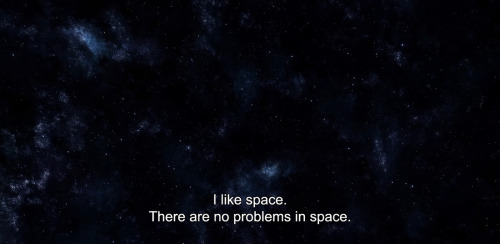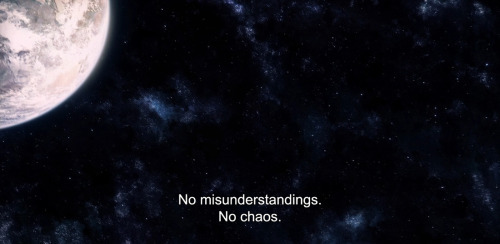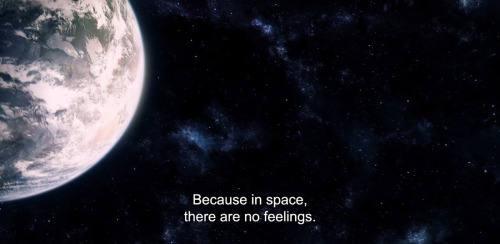C.E. Santana's Blog, page 2
December 21, 2022
jamesleech:
For a story by The Atlantic on Cormac McCarth...

For a story by The Atlantic on Cormac McCarthy’s “The Passenger”
Charcoal, graphite on paper
After a few years, I’m back in Tumblr. In that time I dabbled...
After a few years, I’m back in Tumblr. In that time I dabbled with some animation directing. These screenshots are from the video I directed for Cozy’s song “De Mi.”
My whole inspiration for the video was to capture shots that my younger self, ten years ago, would’ve have posted on Tumblr.
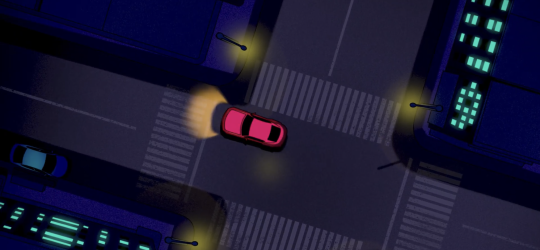
March 18, 2020
RE-RELEASE: ONE NIGHT ONLY
March 14, 2020
RE-RELEASE: PAINT

A couple tries to keep their sanity in a post-modern dystopian reality.
Watch the short film directed by Armand Zentil:
PAINT
C. E. Santana
In between her legs, as she squeezed her thighs to my ears, I swore I could hear the ocean. At least, it sounded like how I remembered the ocean. Everything I heard or smelled or felt reminded me of something that was. I used to hate being nostalgic. I used to think dwelling on something, regardless of how fondly you reminisce, was a waste of time.
The morning lovemaking sessions were just something we did to keep us sane, and our morale high. The love aspect had begun to diminish some time ago. I had lost count of how long exactly. Like pretty much everything else. I didn’t know the time of day, the month, and I assumed, from the last time I saw the date, that it was the year 2014. The last time I noticed the date was the last time The Man in The Suit brought supplies. On the box, they’d stamp the date, so you had no choice but to see it because they knew that after a while, you found it pointless to keep track of time and destroyed anything that told you what month or year it was.
I didn’t want to get up that day. Like all days. What was the point? I used to love saying, “Same shit, different day,” when someone asked me what was up. I should have gotten used to saying something like “Life is great. Every day is a new beginning.” Maybe that would have changed something in the future. I closed my eyes and tried to imagine my old life. I didn’t necessarily take life for granted, but I didn’t expect life to change so rapidly. Nobody did. I guess that’s life.
Still, I was one of the lucky few. I still had her. I still woke up every morning with her next to me, her face glowing, even though she had stopped caring about her appearance years ago. I looked up from the bed and saw her sitting in front of her mirror, gently brushing her hair, her robe slightly off her shoulder exposing her soft skin. I went over and kissed her neck. She tried to smile. It was hard. For sanity and morale purposes, she used to get up a little bit more excited. Now she just sits on the edge of the bed and stares at herself in the mirror, gently brushing her hair, trying to keep her beauty alive, a deep depression killing it, causing wrinkles and her hair to fall out. When her hair first started to fall out, I ordered Biotin vitamins from The Man in The Suit, and for weeks (maybe months) we waited. Finally, a bottle of twenty-five pills arrived, along with a generic hair regrowth foam. It was already too late; her hair was thin and fragile. Luckily, (if you can call it that) the wig we ordered also arrived –early, considering it was a low demand product. When she took it out of the box, she started to sob. She didn’t come out of the bathroom for hours. Finally, she opened the door and with only her hand out, she asked for the wig. Our wine rations also arrived in that shipment and when she came out of the bathroom for dinner, her wig on, I poured her a glass and told her she looked beautiful. Which she did. Eventually, her spirits improved, her depression subsided, and her real hair grew stronger. She stopped using the wig, stashing it deep in her closet and cut her hair shorter, so that it wouldn’t fall out so easily. When I saw her with her new haircut, I told her she looked beautiful. Which she did. As beautiful as the first time I saw her.
I was at a bar with some friends. It was early two thousand, eh, ten, I think. No, I’m sure of it. There were some things you just didn’t forget; just sometimes I confused dates. We were gathered around drinking, as usual. We were facing the door of the bar. I noticed her immediately when she walked through the door. One of the buddies I was with knew one of her friends so they sat with us. I didn’t say much. I just looked at her and tried to make eye contact. When she caught my eyes, I would look away, then look back to see if she was smiling. She wasn’t. I went outside for a cigarette, hoping she would follow. She didn’t. I decided to head back home, to Jersey.
Two weeks later I saw her at the same bar, this time alone. I asked her if she drank by herself often. She said she did but didn’t feel depressed about it. She just liked being alone sometimes. I told her I could relate. I asked her if I was interfering with her alone time. She laughed and said she wasn’t completely anti-social. She did enjoy good company. I asked her what she did. She said she was an artist. She was in New York from Spain. I asked her how that was going. She shrugged. I told her I was a security guard. She asked me how I liked that. I shrugged. It’s a job, I told her. It gets lonely, though. I daydream a lot. About what? She asked. I don’t know, I guess about a better life. Being rich. Is that all you dream about? She asked. Money? No, just what money affords. Where are you from? She asked. I told her Jersey. She asked: Like the shore? I told her, No, North Jersey, right across the river in Jersey City. We stayed at the bar for another hour or so drinking and talking about her art. I told her I wished I had bigger dreams than just getting rich dreams. Something fulfilling, like her art. She said I was still young and assured me I had nothing but time.
Nothing but time. Daily, hourly, constantly, I repeat the mantra in my head over and over and over again like a mad man. Nothing but time.
I finally got up from the bed and went to the bathroom. I looked at myself in the mirror. For sanity and morale purposes, I grabbed a trimmer and started to lower my beard down to a five o clock shadow. I put moisturizer on my face. I grabbed the generic hair regrowth foam and rubbed it into my hair. I flossed and brushed my teeth. Took a shit. I grabbed the garbage from the bathroom and stuffed it along with the other trash from our apartment into a large black bag. I went out to the hallway of the building to the trash chute room. I opened the shaft and stuffed the trash inside. I went back inside the apartment and sat on my reading chair. I fell asleep shortly afterward.
“I don’t think I dreamed,” I told her after waking up. She was standing above me with my mug of coffee in her hand. “For fear of explosion,” I told her, laughing.
The night before we watched films. Every once in a while The Man in The Suit delivered movies, like how Netflix used to. One movie we saw called “Visioneers” was about people in the future who were exploding from stress. I thought it was okay. I enjoyed it. I don’t know if she did. We didn’t talk about it, but when she laughed at my reference, I guess she did.
“I mean I was only passed out a few minutes.”
“No, last night. Did you dream? You were shaking a bit,” she said.
“Maybe. If I did, I don’t remember what I dreamt.”
“Are you hungry?” she asked.
“I can eat. What’s on the menu, the usual?”
“I’ve told you to stop saying that.”
“I know. But I can’t help it.”
After we ate the usual –a generic man-made tuna fish type of protein –we had sex. Then we laid idle in bed. Idleness was the activity we participated in most. Idleness was our biggest enemy. But It was unavoidable. We could do yoga, or have sex, sometimes we’d have a little dance session, me and her, Bowie and Daft Punk, usually when our wine rations came in, but that was pretty much it. Everything else we did during the day consisted of sitting around waiting for The Man in The Suit to bring us a new shipment. I used to have such a disdain for idleness that my biggest pet peeve was missing the train by seconds then having to wait for the next one. Just sitting there, stuck in a filthy underground subway station, not knowing what was going on outside, used to piss me off to the point of panic attacks. A waste of time. Now there was nothing but time.
Nothing but time.
Like a prisoner doing life, I dwelled a lot on the past. That’s what we were. Prisoners. It was true that at least we had each other. Still, that became a prison as powerful as any man-made building. There was no escaping each other when something was wrong. There was no taking walks, or leaving for a weekend, or crashing at a friend’s pad, or spending time away from each other. Or infidelity: the escape when one’s partner gets too boring.
And in our case, I was the boring one. She was the artist.
I was the jealous one. She was the one who cared more about her work than anything else. I didn’t have that privilege. I didn’t care about my odd jobs.
I was the one who couldn’t deal with the fact that she could be happy without me.
I was the one that was selfish. I wanted her all to myself. I got my wish.
Like in some fairy-tale, I got my wish. I remember shortly before it happened, we were laying in bed idle for the pure joy of relaxation, not the forced act of the present, and as I held her, I whispered in her ear, “I wish we could stay like this forever.”
Nobody knows exactly what happened. The Internet was down immediately, along with television and all other forms of media. The only thing working was radio, but we didn’t even have an AM/FM radio in her apartment. We simply woke up one morning to darkness. I checked the time and it was 11 AM. It was late November 2012. I figured it was just extremely cloudy on a gloomy autumn day. I made her favorite breakfast: scrambled eggs mixed with a tortilla Española and coffee. After working on a mix on the turntables for a couple of hours, I put on clothes to go downstairs for cigarettes. That’s when I realized something was terribly wrong. The front doors of her apartment building were locked. There was no doorman. And after looking through the glass doors it appeared that the doors were covered in plastic. I couldn’t understand it. I went back upstairs and that’s when I realized there was no Internet or cell phone reception. We barely ever talked to our neighbors but we decided to knock on doors. The man across the hall, a foreigner subletting, allowed us inside his apartment to listen to the radio. We sat around his dinner table, sipping coffee, and listened to the news. Apparently, for some reason scientists couldn’t yet figure out, the Sun was being blocked, and since 4 AM that morning, the air on earth was deemed uninhabitable for the first time in like millions of years. There was no explanation on why it all happened so rapidly or when it would be safe to go outside again. They simply said to stay indoors and close all windows. The city of New York City, with all its rich inhabitants (they didn’t state this on the radio, this was the foreigner commentating) was preparing extreme measures to secure the lives of all. This included covering buildings with plastic, a massive task already underway, and basically quarantining everyone. Men in hazmat suits will then be going around distributing information and supplies: first, water and other essentials, then, with time, special requests.
We tried to live every day as if we were simply staying home, as so often we did when it was safe outside. We tried to not think of anything that was going to depress us, but I found that hard to do, as we lay idle in bed, smoking on cigarettes. I was thinking back on my selfishness, and my dying wish, which was safe to call it, when the doorbell rang. I looked through the peephole at the familiar site: eyes looking at me through goggles under a heavy, impermeable suit, and opened the door. In slow movements, The Man in The Suit walked in, placed a box on the floor, and then stepped out. I used to say, “Until next time”, but I didn’t even bother anymore. I opened the box, disregarding the sheet of paper taped to the top with the date and current news, which were always miserable, and looked at the contents. I grinned, knowing that one of the items in the box we’d been waiting for quite some time. I grabbed the metal can of paint and brought it over to the bench, in front of her easel, holding a blank canvas. She didn’t say a word. She stared at it like it was an alien object. Then she looked at me for approval. I nodded my head. She walked over to the bench, sat down, staring at the canvas. She opened the can, placed a dry paintbrush inside, and mixed the liquid slowly like a witch mixing a potion. She then took a deep breath and released all the bottled up angst and anger inside of her, violently attacking the canvas with rapid strokes; like a prisoner noting time on the wall of her cell, she created lines and lines placed side by side each other.
September 26, 2016
Funeral
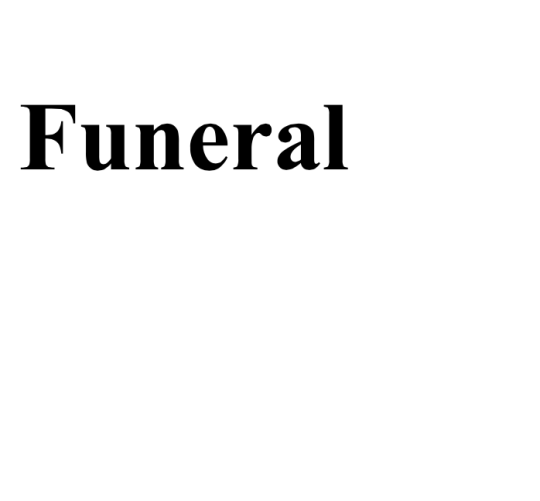
Charlie obsessively checked his Funeral. He refreshed and refreshed and refreshed. He refreshed to see if there was any new Cries. If any old high school friends showed up. An ex or two.
Marisa did the same. She wasn’t expecting much — like a selfie in bad lighting — but yet she found herself checking, then refreshing, then checking her Funeral. She couldn’t help it. She would anxiously tap her leg, twiddle with her fingers, then refresh.
Jonathan, though, was cruising. His funeral was on the verge of going viral. He had stopped looking, was busy preparing tea, and getting ready to settle in for a nice nap.
Funeral was started by a college dropout named Leslie Hammond. Hurting from a devastating break up, he launched Funeral after two sleepless, furious days of binge coding. At his own Funeral, he racked up 3 Genuine Cries, 1 Contagious Cry (like a yawn, a Cry because there’s crying around), 0 Strangers Showing Respect, and 1 ex, but not the one Leslie was hoping for.
Charlie refreshed again. He made coffee; he smoked a cigarette; he bit his fingers while he looked at his Funeral. There was his mom, a beautiful woman, Charlie’s friends would always say, some to be assholes, uncontrollably sobbing over his body. His dad, a patient and noble man, standing by her, as always, a hand on her shoulder. There was Charlie’s younger brother sitting in the front aisle, looking slightly bored, but maybe just sad. There was Charlie’s oldest friend who still kept in touch through the occasional text. Charlie regretted not responding to some of those. There was his old neighborhood crew, in their late twenties and worn out, but this was a good opportunity to get the gang back together. There was an old coach from high school, an ex from college, and a few distant cousins. Charlie refreshed again, but nothing had changed in the last five minutes. He shut down his Funeral and smoked another cigarette.
Marisa peeped at her Funeral through an opening in the hand she was using to cover her eyes. Far from the life she led, it was a quiet affair. Where were her old sorority sisters, the ones whose motto was “Live, Love, blah, blah, let’s get fucked?” Where was Janice? Probably playing with her children in her new home Upstate. Where was Cindy? Marisa thought maybe she should have been nicer to her. Maybe she shouldn’t have branded her C.C. — Cunty Cindy. No exes. Not one. Zip. It was probably the distance thing, it had to be the distance, totally the distance thing since her mom insisted her Funeral be in fucking Toms River. Marisa hadn’t lived in Jersey since that one awkward year in Bayonne. Before that, since high school. She lived in New York City. Before that, Long Island for college. Fucking Toms River?
Jonathan napped peacefully. If he was to check his Funeral, he’d see that his Cries were through the roof. Mostly Genuine Cries, too. A dozen strangers had piled in after hearing about his Funeral. Exes, because he maintained friendships, dated back to middle school. People hugged each other and shared stories of all the good times they spent with Jonathan. They remembered the times he went out of his way to help someone. Pictures at his Funeral showed him always smiling, always happy, a life well lived. A couple celebrities even showed up, and one even gave a speech. Speaking of the speeches — like Jonathan, they were moving, joyful, celebratory. He wasn’t big on dwelling on shit. Everyone commented on how good a person he was. Jonathan heard them, he was just too into his nap to thank them.
August 15, 2016
March 21, 2016
"I like to read novels where the author seems knowledgeable; like someone you know you could walk..."
- Rachel Kushner (via mttbll)
November 24, 2015
New Short Story: The Drive

The Uber pulled up to the middle of nowhere. An address in the desert, to be exact, surrounded by nothing but dry hills. It was a rundown motel, and Jose, before he saw the photoshoot set, thought it was a mistake.
Jose waited for Veronica to finish. He could see her sitting by a car, under a canopy, a hair stylist untangling complex layers of clip-on hair until Veronica’s own hair was as short as a boy. As she walked to his car, Jose could see that she was somebody. She was tall and glowing, like a golden child sent to the desert by the Sun; her aura was of someone whose worries passed through her like a ghost, unaffecting her momentum.
“Hello,” she said getting into the backseat of his SUV.
“Hey, how are you?”
“I’m well. You?”
“I’m doing alright… it says we’re heading to Los Angeles, this address is correct?”
“Yes, back to L.A.”
Jose took the highway and for a long time neither of them said a word. Jose had a classical station tuned in, and when he asked if she desired to hear something else, Veronica shook her head, “No, I need to relax. This is perfect.” Most of his customers had no complaints towards classical, and he didn’t mind it, so before a customer got in his car, Jose always switched to the classical station. It was better than listening to some unbearable pop music Jose didn’t understand its appeal; or worse, some obscure hardcore or avant garde or deep techno. He was pleased she wanted to hear this or “nothing at all,” in her own words, for the two and a half hour drive to L.A.
After about a half hour on the road, Jose felt comfortable enough to ask: “Miss, sorry to bother, but are you an actress or a model?”
Veronica was staring out her window, her phone vibrating every few seconds, but she didn’t react to it. “I am, yes.”
“Have I seen you in anything?”
“Probably not. In about a month, I’ll be in the next Michael Bay film.”
“And who is that?”
“He does The Transformer movies.”
“My kids love those films. Me, not so much.”
“I don’t blame you. I hope you like this one.”
“I’ll be more excited to go see it with them now that I know you’re in it.”
Veronica let out her movie star quality smile, and Jose chuckled.
“How old are your kids?” She asked.
“The youngest is ten, the middle one, the only boy, is thirteen, and the oldest is about to turn eighteen.”
“Oh, wow, blessed. I’m sure they’re beautiful.”
“They are. Thank you.”
“And their names?”
“Stephanie, Jose Jr., and Miranda”
“Are you married?”
“Twenty years.”
“Amazing. Good for you.”
“Eh, it’s okay,” Jose said, laughing.
“Just okay?”
“Well… No, I shouldn’t.”
“Wait, what?”
“You don’t want to hear my problems, I’m sure you have enough of your own.”
“Yeah, but I have therapists.” She laughed. “Do you go to therapy?”
“Oh, no, never. That’s not something people in my culture do.”
“Are you Catholic? Do you see a priest?”
“No, we go to a Protestant church.”
“Priest don’t know shit anyhow. They’ll just tell you you’ll be okay by confessing, but never actually tell you how to be okay. I’ll be your therapist today. Tell me whatever. I respect privacy. Being in my profession, I respect privacy more than anyone.”
Veronica was now sitting up in her seat. She wore a look of honest sincerity, comforting Jose.
“Ah, what the hell,” Jose said.
Jose and his wife met when Jose was nineteen and she was sixteen. It was his first day as a stocker at a supermarket in his South L.A. neighborhood. She was a cashier. They started dating within a week; by week three she was pregnant. Six months later they were married. In hindsight, the immense responsibility of raising a child matured Jose into a man: he enrolled in night school, he stopped hanging out with friends he deemed dangerous — some who later spent time in jail or are dead — and dedicated his life to his new family. After five years they bought their first home and soon assimilated into an ideal middle class American life: family dinners at restaurants on Sundays; soccer practice and piano recitals; two week vacations every year to Disney World, to Mexico, to Hawaii, to New York, to their homelands, Guatemala (Jose’s) and El Salvador (his wife’s); and their ten year old anniversary spent in Paris, his wife’s life-long dream.
Starting in his mid thirties, Jose began having thoughts that consumed him. He was going through a midlife crisis. His oldest daughter was starting college and to make extra money Jose started taking on second and third jobs. Later, he leased a shiny, all black Cadillac Escalade and began to Uber on his days off. The money was great and soon he quit all his other jobs, including his career of fifteen years, as an engineering mechanic at manufacturing plants, and drove full-time. He drove around rich kids going to clubs, bridal parties to Vegas, movie execs to private airports, coked up actors to houses in the hills. Every night provided excitement. There were blowjobs in the furthest backseat, rappers smoking weed, inside views into the lives of the rich, who seemed to not care about consequences, who had open affairs, who traveled the world on a whim, whose driveways were larger than Jose’s entire block in his neighborhood. It wasn’t until he started to Uber that an existential dread started to cloak Jose’s existence.
“I started to question the what if’s,” he said to Veronica, who listened intently. She had even turned off her phone to show Jose that she was present with him.
“What were those what if’s?” She asked in the non judgemental tone of a real therapist.
“I married at nineteen. I was pretty much a virgin when I met my wife. I say pretty much ‘cause I lost my virginity to a neighborhood girl who fucked anyone — excuse my language — so it didn’t really count in my opinion. To me, I’ve only ever been with my wife. Which I love, of course, but seeing how other people live, I guess I never realized how much life there is to live out there. I can’t just get up and leave whenever I want. If I’m sick, I have to go to work. If I go on vacation, it’s with her and the kids. I started to wonder how different my life would have been if I didn’t meet her and married so young. I started to envy my Uber passengers, especially the men my age. Sometimes they share stories with me. Like if I’m taking them to the airport, they tell me about the girl they have waiting for them in like Tokyo. Or if I pick them up at the club, I watch them with a beautiful girl. Shit, sometimes they’re with two girls. I imagine what it’s like to go to a mansion in the hills and enjoy life.”
Jose paused. He looked out the window at the strip malls that started to take over the desert hills as you approached the vast urban spread of Los Angeles.
He sighed, “I’m a terrible person.”
Veronica related to Jose more than Jose knew. Her father, a director, spent years in the tabloids, a new scandal every week, it appeared. He divorced his wife, Veronica’s mom, an actress in her thirties, after he cheated on her with a younger woman he met in one of his films. He remarried then divorced after another cheating scandal. Veronica, until a few years ago, went without speaking to her dad for years. He was the man Jose envied, and who Veronica loathed. She had grown up in hills of LA, tried coke for the first time at fourteen, was burnt out from nightlife by the time she was eighteen, and appeared to had turned her life around when she moved to New York to study at NYU, but then dropped out when her modeling contracts reached the millions of dollars. It was back to the only life she knew: vacations to far-off islands; work in Paris and Rome; dinners with friends, all children of fame, and with artists and models and musicians; dates with actors who played superheroes, and lead singers who lived in studio apartments in the East Village. By twenty-five, her present age, she had lived life times five, the only thing to do now was to settle, to try to live a stable life, to go to work everyday and come home to her dogs and Netflix and books. She didn’t want kids just yet, but she was starting to think of her life in her thirties. She wanted to start directing films. Her relationship with her dad became warmer with age. He was now married to his former care-taker after his stroke at age sixty. He was working again. Not on the blockbusters he was known for in the eighties and early nineties but on small films without explosions and special effects. Actually, Veronica’s first film role was in an highly acclaimed film by her father, about a spawn of Hollywood fame, who after years of debauchery reestablishes the relationship with her father, a womanizing film director, and together they learn how to forgive and love again.
“My father…” Veronica said after a long silence. She then went on to tell her story.
“I love your dad’s movies.”
“He’s one of the greats.”
“I’m sorry he put you through that.”
“It’s fine. Well, it wasn’t fine for a long time, but it’s fine now. I don’t hate him anymore. Have you ever acted on your thoughts?”
“What do you mean?”
“Cheated on your wife?”
“Oh, no. Honestly. It’s just thoughts. Horrible thoughts.”
“Don’t be so hard on yourself. We all have horrible thoughts at times. What makes us
strong humans is the strength to not act on them.”
“It’s hard. I’m not going to lie. My wife and I, we don’t really have sex anymore. It’s
been more than a year.”
“Do you still love her?”
Jose didn’t answer for a long time. Veronica didn’t push him, either. Finally, Jose said:
“Don’t think my silence answers your question. I do love my wife. She’s the mother of my children, and she’s the strongest woman I’ve ever known, next to my own mother. I was just thinking about the first time I fell in love with her. We were walking in the old neighborhood and walked past an old friend’s house. He was outside on his porch, as usual, and when he saw me, he walked to greet me. I introduced him to my girlfriend, the first time I had said those words, it sort of just slipped out.”
“That’s why I haven’t seen you around.” The guy said.
“I’ve been busy with work and stuff.”
“Okay, sure. I could have used you on Friday, homes. We was up at this party, and some punks stepped up to us. It was only me and Erick. Erick was getting his ass beat. I had to go my car for the gat. Almost blasted those fools but they backed off.”
Jose could vividly imagine the scenario. He had been there before. A house party, a bunch of kids with nothing to do, too much booze, someone bumps into someone, someone gets punched, someone gets stabbed, someone gets shot. As Jose pictured himself fighting over nothing, he felt a warm, delicate hand grab onto his. He looked into his girlfriend’s eyes and they said it all: you’re safe with me.
“That’s when I knew I loved her. She was all that I needed.”
“Is she all that you need now?”
Jose began to sob. It came out of nowhere. “I’m sorry,” he said, pulling the car over. He dried his eyes and felt Veronica’s hand on his shoulder.
“I’m sorry,” he restated.
“It’s alright.”
“I just feel like a monster.”
“You’ve never talked to your wife about this, have you?”
“No. But I know she knows.”
“Tell her your thoughts. Tell her everything. Then tell her why you’re telling her all this, that you feel terrible and want to work on your relationship. Then surprise her with a vacation, just the two of you.”
Jose composed himself and continued driving. They drove in silence, just the faint piano keys from the low radio could be heard.
They approached Veronica’s home, a modest house in Loz Feliz, barricaded by trees and vines. Jose stopped the car and turned his entire body to face Veronica.
“I want to thank you. Maybe it was destiny I picked you up today. I don’t know how much longer before I did something drastic I would have regretted for the rest of my life. You helped me in ways you’ll never know and I don’t know how I’ll ever repay you.”
“Give me your phone,” Veronica said. Jose handed her his phone and she typed something into it.
“I just texted myself. First, I want you to bring your whole family to my movie premier next week. I want to meet your kids. I’ll text you the info later today. Then, find some vacation time for both of you and then call me. My mother and I have a vacation home in Cabo. We barely use it this time of year. Take your wife there. Enjoy life. Take molly with her. Seriously.” Both Veronica and Jose laughed. “Smoke some fucking weed. Get drunk off tequila and wine. Live like there’s no worries. Love like you were nineteen again.”
“Thank you.”
“My pleasure. Enjoy the rest of your day.”
November 12, 2015
what do you think about steve jobs?
One of Heraclitus’ best lines turns on a pun. In the archaic dialect of Greek that Homer used the word for an archer’s bow is bios (βιός). The Greek word for ‘life’ is spelled the same way (βίος). Heraclitus’ line runs:
βιός τῷ τόξῳ ὄνομα βίος ἔργον δὲ θάνατος
The name of the bow is life but its work is death.
This is the first and the last word on technology.
Technology is cleverness at play in the material world. Technology seeks to improve life by the manipulation of unthinking matter. But, because there is nothing less intelligent than cleverness, these manipulations take place wholly by the light of death. Technology is to death what the gold ingot is to the thousand tons of ore. Every attempt to improve the present conditions of life by technological means is a further tribute laid at the feet of death, as he sits in the absolute sovereignty which this activity grants him.
This quickly stops seeming like hyperbole when you imagine what an immortal version of yourself might be like: Would a you that could not die try to augment anything about your body? Would that immortal person need a car or a ship when walking and swimming can be sustained indefinitely? Would events and feelings—whose details could never be obliterated—need to be committed to paper? Would time itself even exist, to say nothing of needing keeping, to a you whom change could not affect? And if space and time become irrelevancies, of what possible interest is manipulating the dead matter that occupies these domains?
What we call ‘technology’ is then a kind of textile. A thread of cleverness crossing the threat of death. We are clothed in the fabric that this technique creates; we wear it like a better skin to keep out the several chills that mortal life is born to. But the chill is woven in.
One of the better films about technology seems to have been made with Heraclitus’ insight in mind. If you’ve ever looked into Homer’s Odyssey you may remember that the weapon associated with Odysseus is the bow. In 2001: A Space Odyssey, death is the first and second use to which technology is put. The monolith reveals something to the ape-men, and soon they club tapirs and one another to death. A later protagonist of the film, called Bowman, uses a smaller club to kill a machine. A machine who murdered men when it first realized that it could die.
The intimacy with which death penetrates technology is something that is more often felt than realized. This intimacy is why a robot seems more and more like a living corpse as its appearance approaches that of human flesh; why a dying person seems to die twice as much when a respirator pumps air in and out of their lungs through a corrugated tube threaded down their throat; and it is this intimacy that cloaked the death of Steve Jobs in an aura that that death could never otherwise have assumed.
Steve Jobs came to represent the mirage of eternal life that shimmers across the face of technology when death is so close as to become impossible to distinguish. This is the mirage that makes the bow life when its work is death. It is what the monolith whispered to the ape-men that made them kill to eat meat and kill to drink water; it is what men, in turn, whispered to HAL and what Bowman was born knowing. When Jobs died of cancer the air became momentarily clear. The mirage flickered, and then it vanished. The world seemed to grieve for a man it did not know, but this grief was what the hands felt when the hem of what we have become frayed just enough to feel the threads themselves.
September 24, 2015
"Carry Bolt Cutters Everywhere": Werner Herzog Has 24 Amazing Pieces Of Advice
1. Always take the initiative.
2. There is nothing wrong with spending a night in jail if it means getting the shot you need.
3. Send out all your dogs and one might return with prey.
4. Never wallow in your troubles; despair must be kept private and brief.
5. Learn to live with your mistakes.
6. Expand your knowledge and understanding of music and literature, old and modern.
7. That roll of unexposed celluloid you have in your hand might be the last in existence, so do something impressive with it.
8. There is never an excuse not to finish a film.
9. Carry bolt cutters everywhere.
10. Thwart institutional cowardice.
11. Ask for forgiveness, not permission.
12. Take your fate into your own hands.
13. Learn to read the inner essence of a landscape.
14. Ignite the fire within and explore unknown territory.
15. Walk straight ahead, never detour.
16. Manoeuvre and mislead, but always deliver.
17. Don’t be fearful of rejection.
18. Develop your own voice.
19. Day one is the point of no return.
20. A badge of honor is to fail a film theory class.
21. Chance is the lifeblood of cinema.
22. Guerrilla tactics are best.
23. Take revenge if need be.
24. Get used to the bear behind you.
The definitive manifesto.


